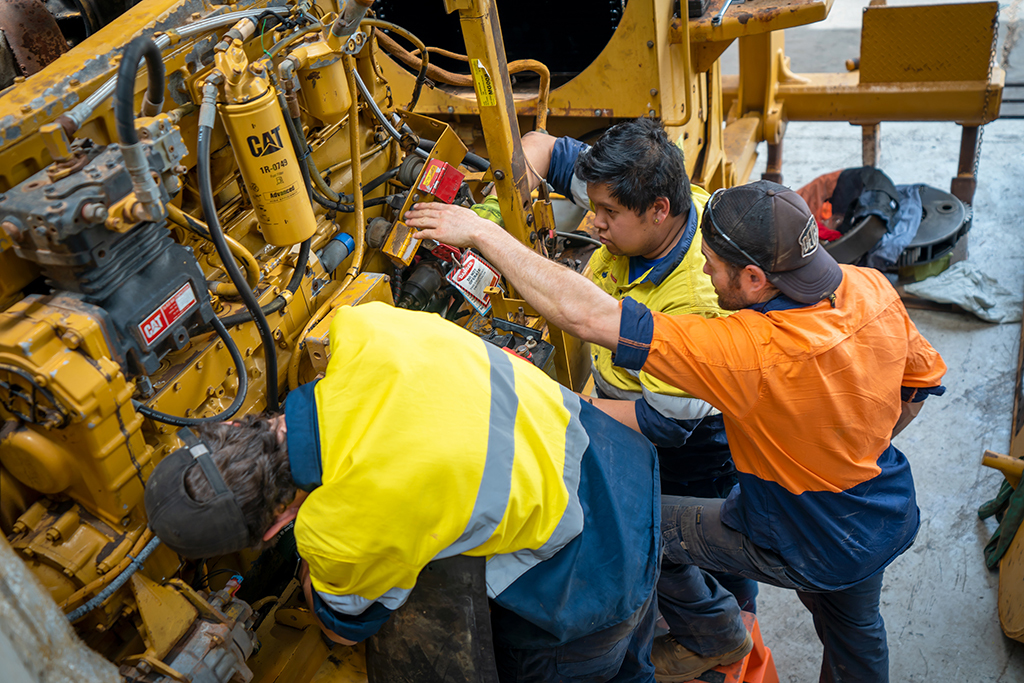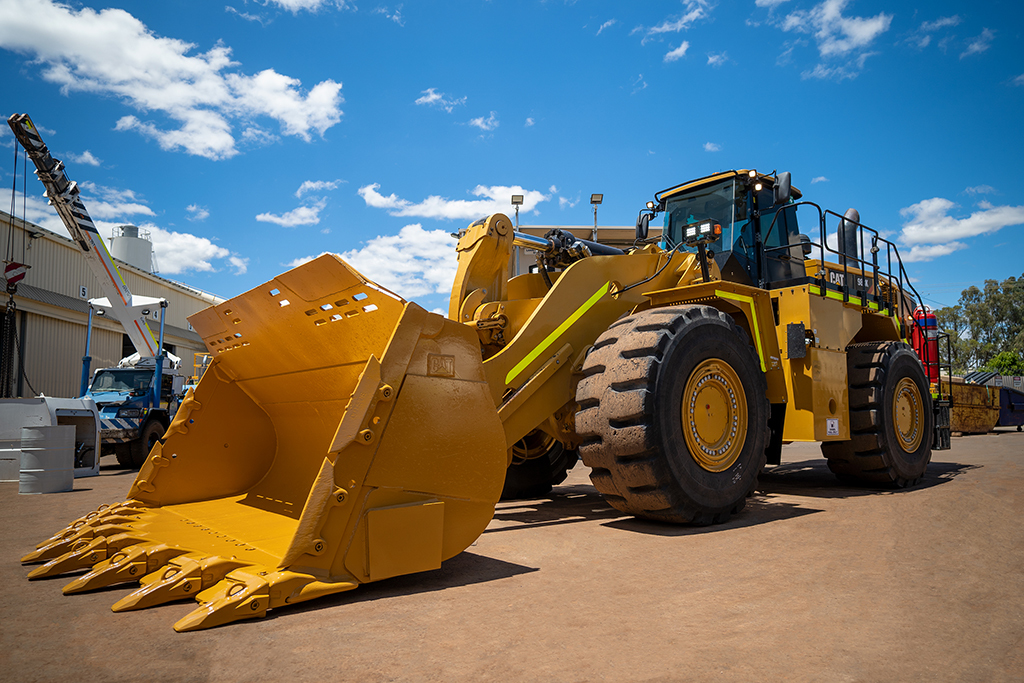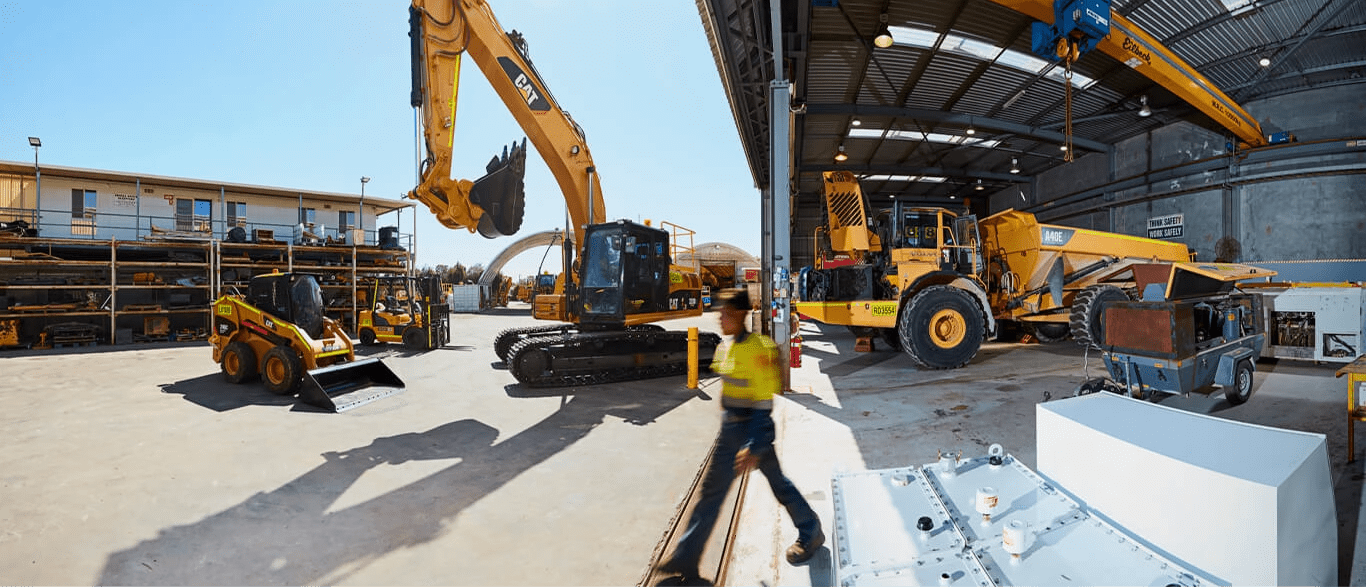How To Optimise Your Wheel Loader For Your Project
Optimising your wheel loader in today’s demanding construction and mining projects can significantly improve productivity, efficiency, and overall project success. By implementing strategic techniques and practices, you can unleash the full potential of your wheel loader, ensuring it operates at peak performance while meeting project requirements. This article explores the various aspects of wheel loader […]
Tips For Choosing The Right Wheel Loader For Your Business
Choosing the right wheel loader for your business can be daunting, especially if you’re unfamiliar with the different types of loaders available in the market. A wheel loader is an essential piece of equipment for many businesses, from construction sites to farming operations, and it’s important to choose one that meets your company’s specific needs. […]
5 Important Tips for Daily Wheel Loader Maintenance
A wheel loader or front-end loader is the backbone of any construction project, providing essential mobility and stability. Thanks to their large wheels, this heavy equipment excels at handling damp surfaces while carrying significantly larger loads than an excavator due in part to their front-and-rear axle structure. Wheel loaders are indeed valuable assets for any […]
Everything You Need to Know About Renting a Wheel Loader
The ever-changing dynamics of the mining and construction sector call for versatile and high-spec wheel loaders. Also known as front-end loaders, wheel loaders are large four-wheel drive machines with mighty strength and durability to carry out heavy earthmoving tasks. Its purpose is to lift, hold and transport materials on a mining or construction job site […]
A wheel loader or front-end loader is the backbone of any construction project, providing essential mobility and stability. Thanks to their large wheels, this heavy equipment excels at handling damp surfaces while carrying significantly larger loads than an excavator due in part to their front-and-rear axle structure.
Wheel loaders are indeed valuable assets for any mining, earthmoving, or construction projects. However, if proper maintenance procedures are lacking, you run the risk of quick degradation and depreciation. This heavy equipment can quickly become a liability on your worksite without regular servicing. Not only can they stop performing as intended, but faulty parts can also lead to accidents.
In this article, we explore 5 important tips for daily wheel loader maintenance so your asset can net you a profitable return for many years to come. Before that, let’s delve a bit into why maintenance is so crucial.
Why Should I Maintain My Wheel Loader?
Businesses that take care of their property extend their longevity and usage, particularly in the long term. Whether it’s a wheel loader or excavator, or any other asset, proper maintenance allows you to keep it running at optimum performance for longer.
Wheel loaders are expensive pieces of machinery that you invest heavily into for your earthmoving and construction projects. Regular wheel loader maintenance ensures that your investment is reliable, effective, and high-performing, allowing you to get the most out of it for longer.
Buying such equipment can cost you from tens to hundreds of thousands of dollars, depending on the model and features you require. Once you make the purchase, you can expect the heavy-duty vehicle to last, on average, about 10 years or around 7,000 to 12,000 hours with regular use. However, many who fail to follow through with daily maintenance succumb to a shorter lifespan that generally amounts to half or sometimes even a quarter of that time!
Regular maintenance helps you avoid common issues and breakdowns and increases overall profitability by reducing downtime. Plus, maintenance costs naturally increase over time due to wear and tear on specific components. If daily maintenance is neglected, you may need to pay an exorbitant amount when your equipment inevitably needs a tune-up or servicing.
Now that we’ve seen the clear monetary benefits of maintaining your wheel loader, here are 5 tips from experienced industry experts to help you preserve your asset.
1. Know Your Machinery
A wheel loader is a considerable investment with great potential — if you know how to use it right. To get the most out of it, ensure that not only are you familiar with its basic operations but also read up on the ins and outs of the machinery, mainly the more specific functions. A clear understanding of your wheel loader helps you identify potential issues in their infancy and nip them in the bud.
For instance, if you’re well aware of your machinery, you’ll know that manufacturers incorporate variable-speed reversible fans to clear out any dust or debris that could cause blockages and performance issues to ensure your machine’s cooling system runs optimally. However, its efficiency can get reduced, or it may even get clogged in dusty environments like aggregate quarries. Understanding what’s what and where to look helps ensure your equipment is properly operated and taken care of daily.
2. Inspection & Maintenance Schedule
Just as other companies have their products and services inspected or analysed regularly to identify and fix issues so that customers get the best version of them at all times, regular wheel loader inspection is a major game-changer. By quickly identifying any damage or wear to high-impact tools and attachments, repairs can be made before significant issues arise, helping maximise job productivity over time.
Let’s take the example of wet environments on the job. While these conditions can make life easier for certain tasks, they also present an increased risk of material build-up along the drive shaft. This build-up may hide issues requiring repair, leading to costly downtime if left unchecked. Regular inspections let you swiftly identify and deal with these.
Here are some considerations when inspecting your wheel loader:
- Check all fluid levels, including the engine oil, coolant, brake and transmission fluids.
- Inspect all hoses and belts for cracks or signs of degradation.
- Ensure the filters are functioning optimally.
- Note the pressure on your tyres, which dramatically affects overall machine efficiency.
- Don’t forget to inspect attachments, bucket teeth, and tilt and lift cylinders.
- Ensure the radiator, AC condenser, and exhaust pipes are also inspected.
Develop a maintenance schedule where you or your operators closely inspect your wheel loader, at least with the above considerations in mind. Even simple daily visual checks should help your machine remain operational at peak performance level for longer. An inspection checklist should help you with this.
3. Ongoing Maintenance
Ongoing maintenance refers to any and all preservation efforts while using your wheel loaders, such as avoiding overloading the machine in terms of its bucket capacity, as this can damage its wheels and fuel efficiency. Knowing your machinery helps you stay attuned to any potential red flags like unusual noises or malfunctioning gauges. The more mindful you are when operating your wheel loader, the better off it will remain and avoid high upkeep for maintenance needs.
Extend the life of your machinery and equipment by taking a few simple steps:
- After each use, remove debris from all surfaces, then lubricate moving parts for optimal performance.
- Keep axles and seals clean for closer inspection and monitoring.
- Keep windows and rearview mirrors clean for enhanced visibility and to maintain a safe line of sight while operating the wheel loader.
- You can also go beyond basic cleaning with degreasing or polishing tasks weekly or monthly. This helps prevent dirt build-up, grime accumulation, and corrosion over time.
- Tighten loose components and ensure proper lubrication of all necessary parts.
Keeping your wheel loader in tip-top shape is more than just about fast repairs and cleanliness. Appropriate storage is also necessary since incorrect storage can cause rusting, faulty wires, or other issues. Plus, wet conditions can bring about mould and mildew build-up, which means expensive costs down the line, so be sure you follow manufacturer guidelines for optimal storage.
4. Operator Training
Like any other equipment, wheel loaders are susceptible to damage from daily usage, such as through the excessive use of the brakes or shock-loading the drive train. Newer machines can have technology that helps adjust for these errors, but that’s not always the case. Operators who have undergone proper training can become invaluable assets because they are less prone to making costly mistakes that lead to damages and extra wear and tear. They are also better prepared to catch minor issues before they become a major problem.
Here are some cues your operators can follow every day:
- To keep your bucket in excellent condition, keep it off the ground whenever possible.
- Ensure your cutting tool is positioned parallel to the ground for precise, higher-quality cuts and an effortless experience.
- Important parts like the engine oil, fuel filter, air cleaner filter, hoses and belts should all be checked routinely for signs of wear or damage.
- Cleaning the radiator grille can provide extra cooling power to the wheel loader's engine and keep it running smoothly.
- Specific safety procedures should always be followed when operating wheel loaders. For instance, wearing a seatbelt while in motion and not carrying any loose cargo into the cab of the wheel loader.
- Unkempt surfaces can drastically hamper productivity, slowing movement and leading to material losses. To ensure efficient operations on the worksite, operators should avoid tyre spinning while maneuvering to help prevent spills and scattered debris.
Investing in operator training pays dividends in the long run with increased productivity, reduced upkeep costs, and fewer accidents associated with a thorough understanding of machine operations. Incorporating daily preventive care into every operator's routine will help build good habits and keep machines running safely for the long term.
5. Timely & Proper Action
To keep your equipment performing at its best, ensure worn-out parts are replaced as soon as possible. Waiting for them to fail can have serious financial implications and safety risks – but simply replacing the part isn't enough. Instead, take time to find quality components designed specifically for your machine's make and model.

Keeping your wheel loader in top condition requires more than just hard work – the right tools are essential too. Quality parts ensure optimal performance, increased safety standards, extended asset life, and improved efficiency over time. Investing in quality repairs pays off, as it has long-lasting effects that bring tremendous success to any operation.
However, if your wheel loader is in quite a rough condition and requires heavy refurbishment, which will likely cost you a fortune, it may be better to buy a new one, depending on your project needs. But choosing a suitable machine for the job is vital.
When deciding which equipment best suits your needs, look at factors such as the size of your project, precision level expectations and materials used. Researching or getting expert advice about the most suitable piece could mean longer-lasting tools. So, take those few extra steps when necessary – it's worth more in the long run. However, renting a wheel loader tends to be the ideal choice in many cases because of its ultimate convenience.
By carefully repairing, refurbishing, or replacing your wheel loader in time, you save money in the long run and avoid any abrupt hitches in business operations that could cost you plenty.
Need Help With Wheel Loader Maintenance?
Plantman offers comprehensive wheel loader maintenance services that keep your machines running like new for long periods. From regular tune-ups, inspections, and complete engine rebuilds to several models of wheel loaders for rent or sale, we’ve got you covered.
With over 30 years of experience in the heavy machinery and equipment industry, you can be sure that our specialists can get your projects running again at full efficiency in no time. Contact us today or fill in the form below for more information about our wheel loader rental, sales, and maintenance services. We’re happy to be of service!








Now that I’ve found Plantman and they’re local which is a bonus, I won’t need to look elsewhere. They also have an extensive range of equipment that suits our requirements for servicing the mining industry. I have no hesitation in recommending Plantman to any of our clients. Well Done!!!